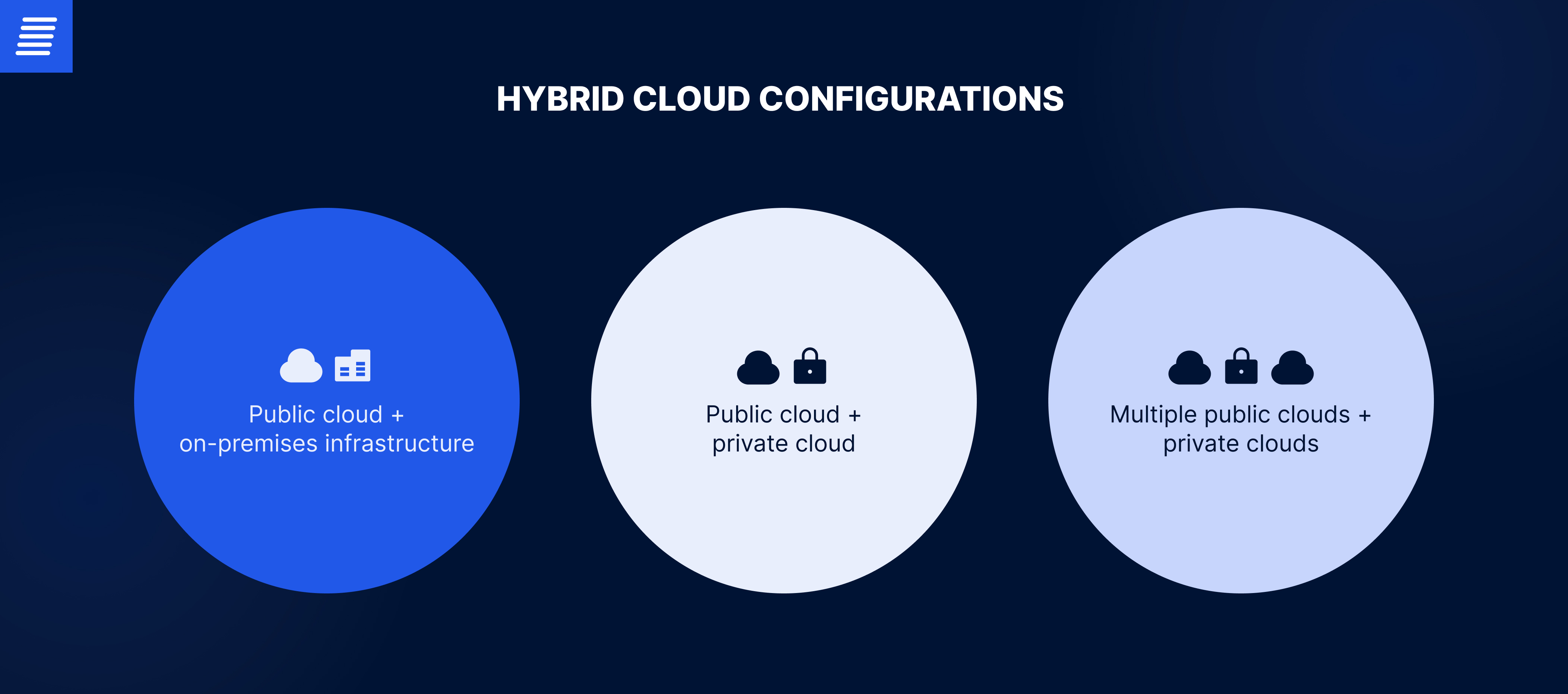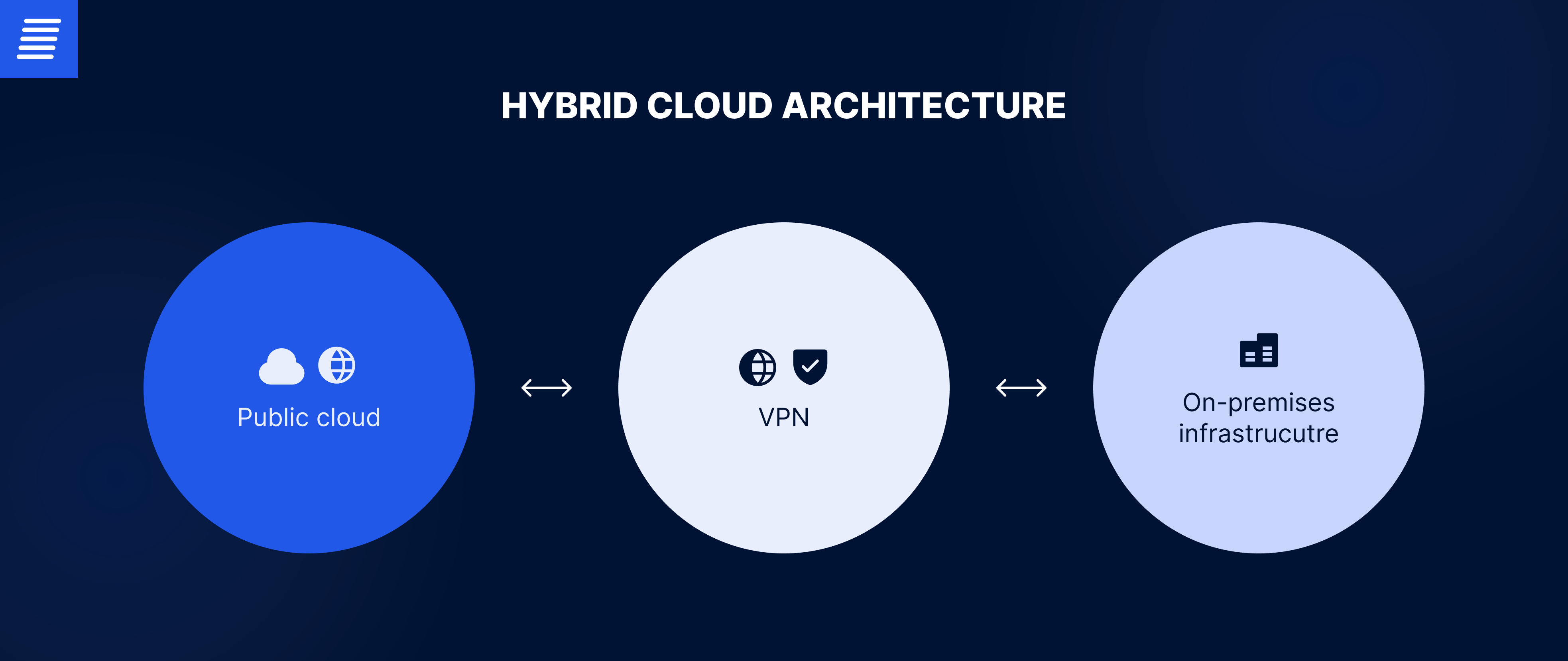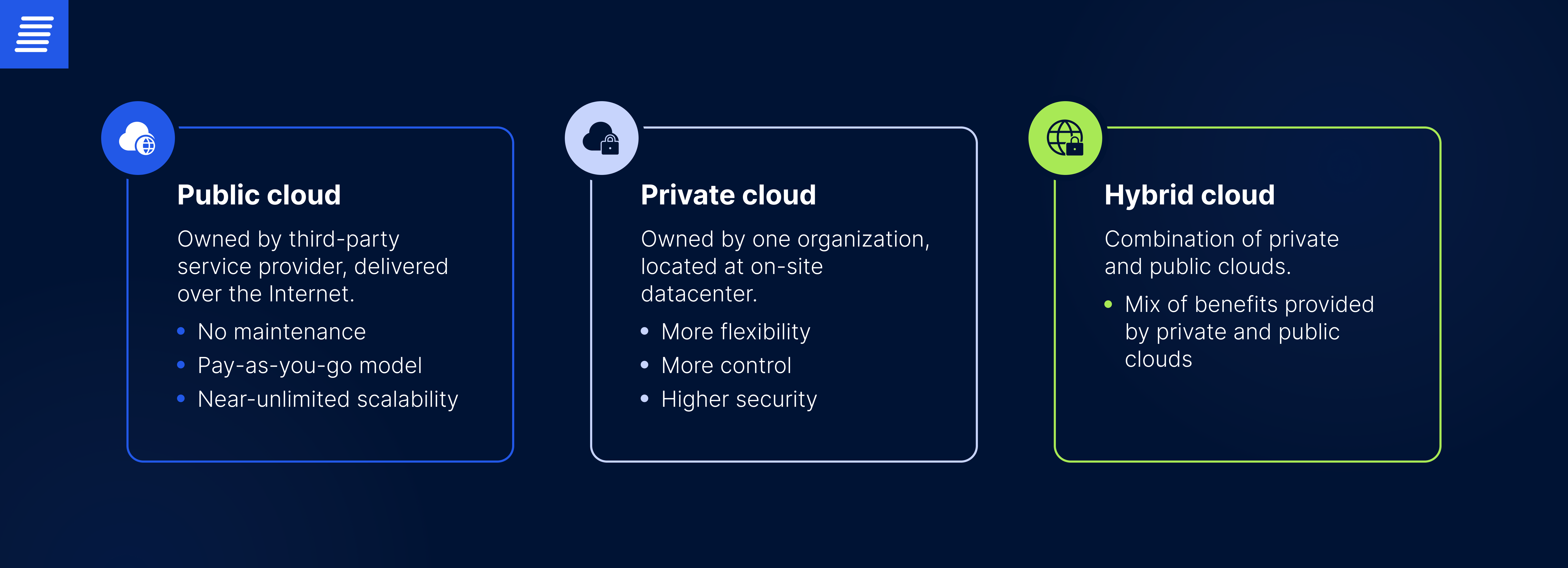
Contact us
Our team would love to hear from you.

In pursuit of improved workload management, businesses are increasingly transitioning to the cloud, with the hybrid type in particularly high demand. In fact, as of 2023, 72% of enterprises reported deploying a hybrid cloud solution.
Read on to uncover the basics, benefits, and bottlenecks of hybrid cloud services, as well as the most popular hybrid cloud usage scenarios.
To expand the capabilities of an enterprise’s network, there’s no need to store all data in the cloud—companies can utilize both the cloud and on-premises hardware. In this scenario, the term “hybrid cloud” refers to a seamless combination of on-premises infrastructure and resources from third-party cloud service providers such as AWS and Azure. Hybrid cloud architecture can vary from company to company.
Possible hybrid cloud architecture configurations:

Hybrid clouds should not be confused with multi-clouds: hybrid clouds always involve a combination of both private and public solutions while multi-clouds involve several public clouds.
Another important difference lies in the network connections between the infrastructures. If the infrastructures are not connected, it is not a hybrid cloud but multiple clouds operating in parallel with each other. The connection between on-premises infrastructure and the cloud is provided by secure channels, such as a local-area network (LAN), a wide-area network (WAN), a virtual private network (VPN), or an application programming interface (API).

To manage the capacity of various resources and environments, organizations use management software, which allows them to maintain the security of the hybrid cloud infrastructure and reap the numerous benefits of this type of computing.
A hybrid cloud presents a modern and convenient approach to organizing enterprise operations. On-premises infrastructure has serious limitations in terms of capacity and elasticity, but not all companies are ready to fully switch to the cloud. In this case, a hybrid cloud solution strikes a balance between the two options. Here are some of its benefits.
Expanding the capacity of a local data center can be daunting, as it involves significant funds for machine purchases and time to integrate them into the IT system. In addition, it may not be cost-effective if scaling down is necessary in the future.
If the public cloud isn’t an option for you due to security concerns, consider a hybrid cloud infrastructure. By delegating non-mission-critical operations to the cloud, you can reduce the load on the private cloud, thus optimizing performance and efficiency. This approach also enables more flexibility in responding to changes in demand.
Although modern cloud service providers offer strong security measures, storing data on-premises remains the optimal way to safeguard data. However, this doesn’t mean you should dismiss the possibility of utilizing the public cloud altogether. Opting for a hybrid cloud approach can provide the best of both worlds, offering the security benefits of a private cloud while leveraging the power of a public cloud.
In addition to enhancing hybrid cloud security, you gain greater control over your data. You can customize the private side of the cloud to match your organization’s needs and allocate assets according to your preferences.
For enterprises considering migrating to the cloud, cost is usually a key factor. Once again, the hybrid cloud is an excellent solution. It eliminates the need to invest in data center infrastructure, including equipment and personnel for maintenance, to accommodate spikes in demand.
Unlike a multi-cloud system, a hybrid cloud can help reduce the cost of migrating digital assets between different clouds, as some providers charge an additional fee for data migration.
Our platform has transformed cloud management and attracted investors.
Opting for a hybrid cloud solution enables companies to mitigate the risks associated with downtime. In the event of a failure, business operations can proceed as usual with minimal downtime and disruption. A hybrid cloud also allows organizations to back up their core data in the cloud while giving them the flexibility to expand their capacity during periods of increased demand. This strategy helps mitigate the risk of overwhelming private servers.
Scalability and agility play critical roles in cloud adoption, allowing companies to gain a competitive edge. Setting up a hybrid cloud enables an organization to quickly respond to evolving customer needs. They can handle large workloads and data sets when needed, while also making informed decisions about resource allocation based on cost and performance considerations.
Using a hybrid cloud facilitates compliance with strict industry regulations and standards that are subject to change over time. By managing sensitive operations within the private cloud and seamlessly transferring data to and from public cloud data centers when required, companies can effectively maintain regulatory compliance.

Hybrid cloud solutions, while offering numerous advantages, also come with some limitations. A hybrid cloud is demanding to build and maintain. The main complexity associated with hybrid cloud solutions involves compatibility, security, and troubleshooting issues.
First, since different services often use various technologies and platforms, enterprises must architect their on-premises cloud with compatibility and integrity in mind to enable effective integration with the public cloud.
Second, although safety is one benefit of a hybrid solution, hybrid clouds are less secure than public clouds. Misuse or a successful attack on the public cloud infrastructure can put the system at risk. For this reason, for domains dealing extensively with personal data, such as banks and insurance companies, the hybrid cloud is not an option due to stringent legal requirements.
Third, if a problem arises, the approach to troubleshooting differs between private systems and public clouds depending on the location of the issues. Efficient resolution may require the expertise of highly skilled administrators and cloud engineers.
In addition, setting up and maintaining a hybrid cloud can be expensive, as organizations must invest in both on-premises hardware and cloud services, which can strain budgets.
If a hybrid cloud is the best fit for you, below are some possible ways you can leverage it to maximize business benefits.
Immediate transition to the cloud is nearly impossible. A hybrid cloud approach serves as an essential intermediate step in on-premises-to-cloud migration. Such migrations often require substantial time, especially for extensive projects, during which all project components must remain accessible to users. This is where a hybrid cloud can play a vital role.
According to Statista, disaster recovery is one of the most popular hybrid cloud applications. In this scenario, organizations maintain their critical data and applications on-premises while using the cloud for data backup and disaster recovery purposes. In case of a cyberattack, hardware breakdown, or other catastrophe, a company can quickly and seamlessly move its operations to a public cloud infrastructure.
We delivered a groundbreaking platform that enables creators to design gamified voice-driven interactive experiences.
Organizations with fluctuating workloads use the cloud to handle spikes in demand. Whenever on-premises resources reach capacity, excess workloads are shifted to external third-party cloud services to ensure consistent performance.
Edge computing is an increasingly popular solution for addressing latency issues. Gartner predicts that by 2025, 75% of data will be processed at the edge. Organizations may use on-premises edge devices for data processing and then send aggregated or analyzed data to the cloud for further analysis and storage.
Enterprises utilizing hybrid cloud infrastructure can use easily scalable public clouds for their dynamic workloads while keeping less volatile and more sensitive data in the on-premises data center. Therefore, organizations with strict data sovereignty, particularly in the finance and healthcare sectors, can store personal and financial information in the private cloud to meet regulatory requirements while still leveraging cloud resources.
Developers and testers can rely on their private cloud for security and control of the production environment, as well as other operational needs, while simultaneously leveraging the flexibility, scalability, and cost-efficiency of public clouds such as Google Cloud, Azure, or AWS. Hybrid clouds allow the development team to efficiently utilize cloud resources based on project needs, create different testing environments, replicate user experiences from different locations, and access a wide range of tools and services—all while ensuring data security.
In a constantly changing world headed for complete digital transformation, cloud solutions play a pivotal role, offering boundless opportunities for businesses. Forward-thinking enterprises have either already adopted cloud computing or have it on their roadmap. When it comes to deciding between public or private clouds, the beauty lies in not having to choose. A hybrid cloud could be the perfect fit for your needs.
Do you want the best of both worlds? EffectiveSoft’s experts are here to help you.

First, you must assess your needs and goals and conduct thorough research to find a hybrid cloud provider that integrates well with your existing infrastructure. Consider factors such as security, compliance, and flexibility of services, as well as the level of support and expertise they offer. Alternatively, you can free yourself from the long and stressful process of finding the right provider by contacting seasoned experts in the field of hybrid cloud development.
Managing and orchestrating a hybrid cloud environment involves specialized tools and platforms to automate the deployment, scaling, and management of apps across different cloud environments. Solutions like Kubernetes, OpenShift, and other cloud management platforms offer the ability to efficiently manage hybrid clouds.
Hybrid cloud development is supported by a variety of tools and technologies designed to facilitate seamless integration and operation across both on-premises and cloud-based environments. Key among these technologies are containerization tools like Docker and Kubernetes, which enable apps to be packaged and run consistently across different environments. Platforms such as VMware vRealize and Red Hat OpenShift help manage cloud infrastructure, while DevOps tools like Jenkins and GitLab CI/CD streamline deployment processes. APIs and gateways also play a crucial role, allowing secure and efficient communication between on-premises systems and cloud services, while storage solutions ensure data fluidity and accessibility across the cloud spectrum.
To successfully implement a hybrid cloud infrastructure, you need to understand your business and technical requirements, design the hybrid cloud architecture, select the appropriate tools, and ensure you have the necessary skills in cloud development and management. Alternatively, you can opt for an all-in-one solution by engaging a reliable vendor equipped with a skilled team of engineers who can guide you through the hybrid cloud adoption process.
Can’t find the answer you are looking for?
Contact us and we will get in touch with you shortly.
Our team would love to hear from you.
Fill out the form, and we’ve got you covered.
What happens next?
San Diego, California
4445 Eastgate Mall, Suite 200
92121, 1-800-288-9659
San Francisco, California
50 California St #1500
94111, 1-800-288-9659
Pittsburgh, Pennsylvania
One Oxford Centre, 500 Grant St Suite 2900
15219, 1-800-288-9659
Durham, North Carolina
RTP Meridian, 2530 Meridian Pkwy Suite 300
27713, 1-800-288-9659
San Jose, Costa Rica
C. 118B, Trejos Montealegre
10203, 1-800-288-9659